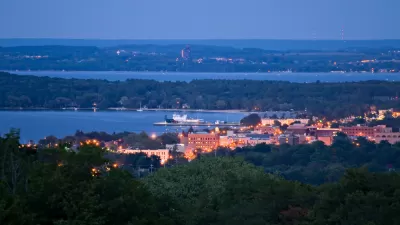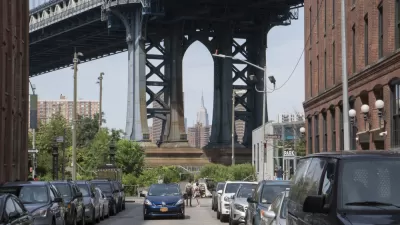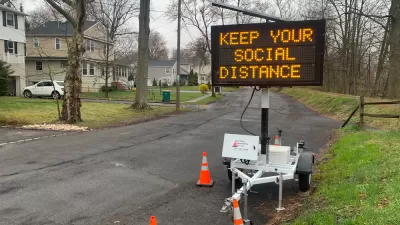Northern Michigan's "premier summer resort town" finds itself embroiled in a heated development controversy, reflecting that town's changing population.
Matthew Dolan reports on the changing fortunes of Traverse City, Michigan. According to Dolan, "[l]ong a sought-after destination for summer tourists, Traverse City's year-round population, individual wealth and real estate prices have grown in recent years, squeezing out young professionals and others from living in downtown where some condos now top $1 million."
At the center of the debate surrounding the city's newfound success is a controversial mixed-use development proposal at the edge of the city's downtown.
"The housing debate is pitting some longtime residents against a newer, younger population as city leaders weigh the size and scope of extra tall downtown building projects. The height of the proposed towers is needed, developers say, to justify setting aside nearly half of the units for lower-income renters," writes Dolan.
Supporting the project are housing advocates who say that the development's mix of supply will allow more people to move to the city. On the other side are long time residents concerned with the scale of the project.
The article goes on to describe Traverse City as emblematic of several trends found in communities around the country: the need to build housing attractive to a mix of incomes and age groups, as well as a shift toward a less seasonal economy. The article is of feature length, with a lot more detail on the context of the debate and the current conditions in the area.
FULL STORY: The growing pains of Traverse City

Alabama: Trump Terminates Settlements for Black Communities Harmed By Raw Sewage
Trump deemed the landmark civil rights agreement “illegal DEI and environmental justice policy.”

Planetizen Federal Action Tracker
A weekly monitor of how Trump’s orders and actions are impacting planners and planning in America.

How Atlanta Built 7,000 Housing Units in 3 Years
The city’s comprehensive, neighborhood-focused housing strategy focuses on identifying properties and land that can be repurposed for housing and encouraging development in underserved neighborhoods.

In Both Crashes and Crime, Public Transportation is Far Safer than Driving
Contrary to popular assumptions, public transportation has far lower crash and crime rates than automobile travel. For safer communities, improve and encourage transit travel.

Report: Zoning Reforms Should Complement Nashville’s Ambitious Transit Plan
Without reform, restrictive zoning codes will limit the impact of the city’s planned transit expansion and could exclude some of the residents who depend on transit the most.

Judge Orders Release of Frozen IRA, IIJA Funding
The decision is a victory for environmental groups who charged that freezing funds for critical infrastructure and disaster response programs caused “real and irreparable harm” to communities.
Urban Design for Planners 1: Software Tools
This six-course series explores essential urban design concepts using open source software and equips planners with the tools they need to participate fully in the urban design process.
Planning for Universal Design
Learn the tools for implementing Universal Design in planning regulations.
Caltrans
Smith Gee Studio
Institute for Housing and Urban Development Studies (IHS)
City of Grandview
Harvard GSD Executive Education
Toledo-Lucas County Plan Commissions
Salt Lake City
NYU Wagner Graduate School of Public Service





























